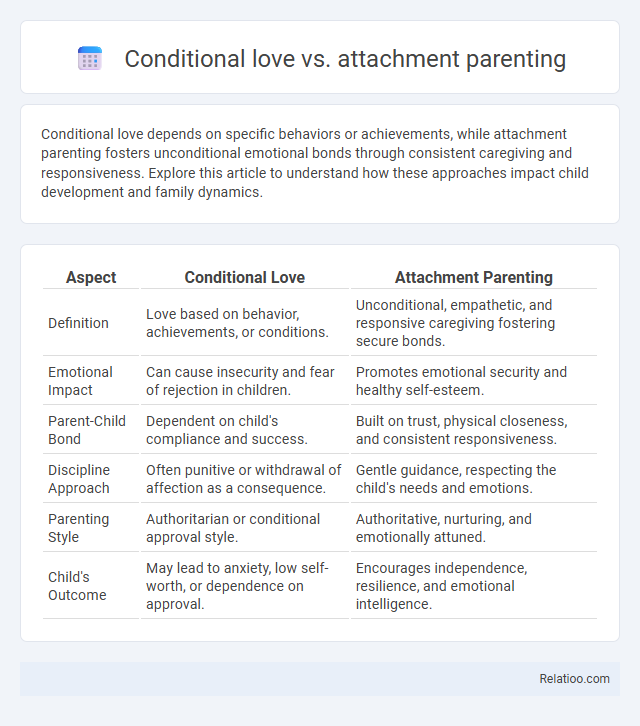Conditional love depends on specific behaviors or achievements, while attachment parenting fosters unconditional emotional bonds through consistent caregiving and responsiveness. Explore this article to understand how these approaches impact child development and family dynamics.
Table of Comparison
| Aspect | Conditional Love | Attachment Parenting |
|---|---|---|
| Definition | Love based on behavior, achievements, or conditions. | Unconditional, empathetic, and responsive caregiving fostering secure bonds. |
| Emotional Impact | Can cause insecurity and fear of rejection in children. | Promotes emotional security and healthy self-esteem. |
| Parent-Child Bond | Dependent on child's compliance and success. | Built on trust, physical closeness, and consistent responsiveness. |
| Discipline Approach | Often punitive or withdrawal of affection as a consequence. | Gentle guidance, respecting the child's needs and emotions. |
| Parenting Style | Authoritarian or conditional approval style. | Authoritative, nurturing, and emotionally attuned. |
| Child's Outcome | May lead to anxiety, low self-worth, or dependence on approval. | Encourages independence, resilience, and emotional intelligence. |
Understanding Conditional Love: Definition and Effects
Conditional love is defined by affection and acceptance based on specific behaviors or achievements, often leading to emotional insecurity and a fear of rejection in children. Unlike attachment parenting, which emphasizes unconditional support and responsiveness to a child's needs to foster secure emotional bonds, conditional love may hinder healthy psychological development and self-esteem. Research indicates that children exposed to conditional love are more prone to anxiety and difficulties in forming stable relationships compared to those raised with attachment-centered approaches.
What Is Attachment Parenting? Core Principles
Attachment parenting is centered on building a strong emotional bond between parent and child through principles such as responsive caregiving, physical closeness, and consistent nurturing. Core principles include breastfeeding on demand, co-sleeping, sensitive responsiveness to a child's needs, and fostering secure attachment to support emotional and social development. Unlike conditional love, attachment parenting emphasizes unconditional support and creating a foundation of trust and safety for the child's well-being.
The Psychological Impact of Conditional Love on Children
Conditional love, characterized by affection dependent on a child's behavior or achievements, can lead to insecurity, low self-esteem, and anxiety in children, undermining healthy emotional development. Attachment parenting, emphasizing unconditional support and responsiveness, fosters secure attachment, resilience, and emotional regulation, promoting psychological well-being. In contrast to attachment parenting, conditional love may create a fear of failure and difficulty trusting relationships, highlighting the critical importance of consistent, unconditional parental love for positive childhood mental health outcomes.
Attachment Parenting: Benefits for Emotional Development
Attachment parenting fosters a secure emotional foundation by emphasizing consistent responsiveness to Your child's needs, promoting trust and stability. This approach contrasts with conditional love, where affection may depend on behavior, potentially leading to anxiety and insecurity. Research highlights that children raised with attachment parenting exhibit enhanced emotional regulation, empathy, and resilience.
Comparing Conditional Love and Attachment Parenting Approaches
Conditional love is based on meeting specific expectations and can lead to insecurity, while attachment parenting emphasizes unconditional love and consistent emotional responsiveness to foster secure child development. Attachment parenting techniques, such as prolonged breastfeeding, co-sleeping, and responsive caregiving, promote strong emotional bonds and psychological resilience, contrasting with the potential emotional restrictions in conditional love dynamics. The key distinction lies in attachment parenting's focus on nurturing trust and empathy without preconditions, whereas conditional love hinges on approval contingent upon behaviors or achievements.
How Conditional Love Shapes Adult Relationships
Conditional love, characterized by affection based on specific behaviors or achievements, significantly impacts adult relationships by fostering insecurity and dependency. Adults raised under conditional love often struggle with self-worth and fear abandonment, leading to challenges in trust and emotional intimacy. In contrast, attachment parenting promotes secure emotional bonds that encourage healthy adult relationships through consistent responsiveness and unconditional support.
Secure Attachments: Key Outcomes of Attachment Parenting
Secure attachments, a primary outcome of attachment parenting, promote healthy emotional development and resilience in children. This parenting style emphasizes sensitive responsiveness and consistent care, fostering trust and a stable sense of security. Unlike conditional love, which can create insecurity and anxiety, attachment parenting nurtures a child's confidence and capacity for strong interpersonal relationships.
Red Flags: Signs of Conditional Love in Parenting
Conditional love in parenting often displays red flags such as inconsistent affection, where Your child's achievements or behavior dictate the level of warmth and approval they receive. Attachment parenting differs by promoting unconditional support, fostering secure emotional bonds without tying love to specific outcomes or behaviors. Recognizing signs like excessive criticism, emotional withdrawal, or love contingent on performance is crucial to breaking the cycle of conditional love and ensuring Your child feels genuinely valued and supported.
Building Resilient Children Through Attachment Parenting
Attachment parenting fosters secure emotional bonds by meeting a child's needs consistently, promoting trust and resilience. Unlike conditional love, which depends on a child's behavior or achievements, attachment parenting emphasizes unconditional support that nurtures self-esteem and emotional regulation. This approach encourages children to develop inner strength and coping skills, essential for long-term psychological resilience.
Choosing Positive Connection: Tips for Healthy Parent-Child Bonds
Choosing positive connection in parent-child bonds fosters emotional security and resilience, emphasizing unconditional love over conditional love to nurture self-esteem and trust. Attachment parenting promotes responsiveness and consistency, encouraging secure attachment that supports healthy development and emotional regulation. Prioritizing empathy, active listening, and setting clear boundaries strengthens relationships while avoiding dependence on conditional approval or attachment-based anxiety.

Infographic: Conditional love vs Attachment parenting
 relatioo.com
relatioo.com